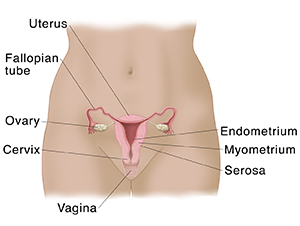Anatomy of the Uterus
The uterus is an organ in the lower belly (abdomen) or pelvis. It is part of the female reproductive system. It's where a baby grows. It's sometimes called the womb.
The uterus is hollow and pear-shaped. It is about the size of a fist. It's in your lower belly (pelvic area). Your uterus is connected to the fallopian tubes. These tubes help carry eggs from the ovaries into the uterus. The lower part of the uterus connects to the vagina and is called the cervix. The wider, upper part of the uterus is called the corpus or fundus.

The uterus has three layers:
-
Endometrium. This is the inner lining. It's shed during a menstrual period.
-
Myometrium. This is the thick middle muscle layer of the corpus or fundus. It expands during pregnancy to hold the growing baby. It contracts during labor to push the baby out.
-
Serosa.This is the smooth outer layer. It covers the uterus and makes it easy for the uterus to slide and move within the pelvis as needed.
In people who still have their periods, one ovary releases an egg into a fallopian tube each month. During this time, the endometrium becomes thicker to prepare for a fertilized egg. The egg enters the uterus. If it isn’t fertilized, it leaves the uterus through the vagina, and the endometrial lining is shed during a menstrual period. If the egg joins with a sperm cell (from a male), this fertilized egg attaches to the endometrium. The thick wall of the uterus protects the growing baby during pregnancy. During labor, the cervix opens (dilates). The muscles of the myometrium help push the baby out through the vagina.
The balance of the female hormones estrogen and progesterone control this process. Most of these hormones are made by the ovaries.
Online Medical Reviewer:
Daphne Pierce-Smith RN MSN
Online Medical Reviewer:
Marianne Fraser MSN RN
Date Last Reviewed:
4/1/2025
© 2025 The StayWell Company, LLC. All rights reserved. This information is not intended as a substitute for professional medical care. Always follow your healthcare provider's instructions.